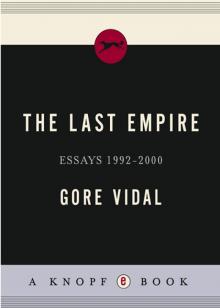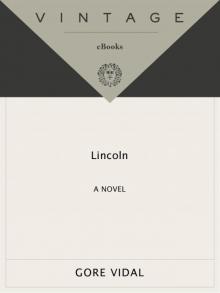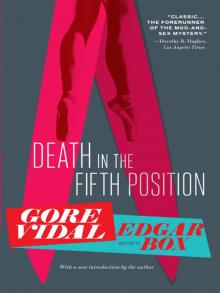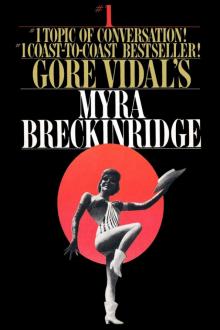- Home
- Gore Vidal
Hollywood Page 6
Hollywood Read online
Page 6
“I am calling Congress back two weeks earlier. On April second. I shall …” He put the dangerous documents on the table beside the bed. “How ironic it is!” He shook his head in wonder. “After all the work we’ve done to control big business, guess what will happen now? They will be more firmly in the saddle than ever before. Because who else can arm us? they’ll say. Who else can administer the war?”
“Who else?” Burden had had much the same thought. If ever anyone benefited from an American war it was the trusts, the cartels, the Wall Street speculators. “We shall revert to the age of Grant.”
Wilson nodded bleakly. “Then, if the war should be a long one, and we be weakened, there is the true enemy waiting for us in the West. The yellow races, led by Japan, ready to overwhelm us through sheer numbers.…”
Edith Wilson entered the room and switched on the lights, dispelling the apocalyptic mood. As Burden got to his feet, he noticed a number of Chinese works of art arranged on tables and in bookcases, no doubt an on-going reminder of Asia’s dread hordes. “From my house,” said Edith, aware of Burden’s interest. “This is not the easiest place to make livable.” She gave the President a sheet of paper. “From Colonel House. I’ve decoded it for you.” Then she caught herself. “Oh, dear,” she turned to Burden, “you’re not supposed to know such things.”
“That Colonel House writes in code to the President? I’d be surprised if he didn’t. He’s in Europe now, isn’t he?”
Wilson nodded. Then he glanced at the letter; looked up at Burden. “Well, he thinks we should recognize the new Russian government. The Czar has abdicated. But Russia is still in the war, and so …” He stopped; and stared at Edith, plainly not seeing her, mind elsewhere.
“We need every ally now, I should think.” Burden was diffident; he was also intrigued at the thought of a president’s wife decoding high secret papers from the President’s unofficial emissary to Europe, the rich and secretive Texas Colonel House.
“Yes. That’s my view. Our ambassador is very enthusiastic about this revolution. So like our own, he tells me. He thinks we should lead the way, and recognize them.”
“Henry Adams predicted all this twenty years ago.” Burden suddenly recalled the joy with which Henry Adams had spoken of wars and revolutions and the certain fall of civilization.
“Is he still alive?” Wilson pressed a buzzer.
“Very much so. But he never goes out, never pays calls. Still lives across the street there.” Burden pointed in the direction of Lafayette Park, as Wilson’s Negro valet, Brooks, entered. Then Burden shook the President’s hand. “You will get,” he said, “whatever you want on April second.”
“How many will vote no?”
“Ten at the most.”
“You encourage me, Senator.”
“You inspire me, Mr. President.”
“That was my aim.” Again the wintry smile. “Now I only wish I could inspire myself.” With the help of Brooks the President got out of bed.
Edith showed Burden to the lift. “He does not sleep well,” she said.
“Neither would I, at a time like this.”
A maid came toward them, carrying a basket of pecans. “They just came, Miss Edith. The silver service brought them.”
“Thank you, Susan. Take them in to Mr. Wilson.” Edith opened the door to the elevator. “There are still things to laugh at,” she said. “Susan’s been with us twenty years, but we lived such a quiet life that she’s still in shock, living here. She’s made up her mind that the Secret Service are really the ‘silver service,’ and there’s no correcting her.” Edith started to say more; then said, “Good-by.”
5
Armed with badge and documents, Blaise Sanford entered the Capitol on the Senate side. In addition to what looked like the whole of the Washington police force, troops were stationed at every entrance, as if invasion was imminent, or were they the invasion? Would there be martial law? he wondered.
Blaise himself had written a highly balanced either- or editorial for the morning’s Tribune, to the distress of the editorial writers, who were openly disrespectful of anything either he or Caroline wrote. The Tribune was essentially Republican and pro-Allies, thanks to Blaise’s influence, with occasional accommodations to the Democrats, thanks to Caroline’s long-standing friendship with James Burden Day. When half-brother and half-sister disagreed on a policy, both positions were given equal space, to the consternation of those few Washingtonians who took editorials seriously.
A thin warm rain demonstrated spring’s arrival. Illuminated from below, the Capitol dome resembled a white gibbous moon against the black sky. There was a smell of narcissus and mud in the air, but the usual pervasive smell of horses was absent. The President’s recent carriage drive to the Capitol to make his inaugural address was said to be the last such drive any president would ever make. The world was Henry Ford’s at last. Blaise took refuge beneath the porte-cochere, where tonight neither cars nor carriages were permitted, thus insuring that everyone got equally, democratically, wet.
Fortunately, the Congress was inside. So no senatorial cabals could block Caesar’s way. Now journalists, diplomats, wives and children were converging on the Capitol, where as each was admitted he was given a small American flag, the gift of an unknown but well-organized patriot.
In the main rotunda, Blaise was stopped by the editor of the Atlantic Monthly, Ellery Sedgwick. “I’m going in to see the President,” he said. “He’s in the Marble Room. Come on, let’s say hello. Tumulty’s made me a temporary member of the Secret Service. That was the only way I could get in.”
Blaise looked at his watch; it was eight-thirty. The speech was scheduled for eight-thirty. But when it came to Congress, nothing was ever on time. The senators were still entering the chamber of the House of Representatives, where, for lack of chairs, many would be obliged to stand.
“I’m going to Henry Adams afterward. Are you? Informal supper. He’s coming.” Sedgwick indicated Henry Cabot Lodge, who was turned in their direction. White-haired, white-bearded, white-faced Senator Lodge gave them a jaunty wave; the bumblebee nostrils were dilated with excitement. As Theodore Roosevelt’s man in the Senate, he was the head of the war party.
At the door to the Marble Room, a Secret Service man stood guard. When the two publishers tried to enter, he stopped them. “Mrs. Wilson’s just gone to the gallery, and he’s about ready. You better take your seat, Mr. Sanford.”
As Blaise started to do as requested, he caught sight of the President. Wilson was standing at the ornate room’s center. He was quite alone, back to the door, eyes downcast. In his left hand he held the cards on which his speech was written. Blaise thought the moment too intimate to watch but, like Sedgwick, he was rooted to the spot as, slowly, like a man in a dream, Wilson walked across the room to a great dusty mirror. Then Blaise saw the President’s reflected face. Everything seemed to have fallen apart. The mouth was cretinously ajar and double chins flowed over the high hard collar. The eyes were round and staring while the muscles of the face were slack. Had this been Paris and the President a French boulevardier, Blaise could have named the drug that he had been taking—opium. But this was the Capitol; and the President was a puritan. Abruptly, Wilson became aware of the image that Blaise could see in the mirror. With both hands, he pushed up his chin, smoothed out his cheeks, blinked his eyes; and the mouth set. In an instant, he was again the lean, dour, hard-faced Woodrow Wilson, whose cold clear eyes were now as watchful as any hunter’s. Metamorphosis duly noted, Blaise slipped away not wanting the President to know that he had been observed.
In the crowded galleries, great ladies begged for seats while plenipotentiaries threatened war, to no avail. Fortunately, the managing editor of the Tribune was in Blaise’s seat; and gave it up. Frederika was next to him, looking pale, youthful, subdued. Next to her was Blaise’s fellow press-lord Ned McLean and his wife Evalyn, bedecked with diamonds, each unluckier than the other if the press—their press—was to
be believed.
“Blaise, old boy!” Ned held out a hand, across Frederika. Blaise shook it. He didn’t like being called “old boy” or indeed anything by Ned, an intolerable young fool, who then proceeded to offer him a silver flask.
“This could be very dry, you know.” Ned’s eyes popped comically. He was like a movie comedian, thought Blaise, declining the flask from which Evalyn took a long swig. “A ridiculous time to declare war,” she said, drying her lips with a fret-work gloved hand on whose fingers diamonds glittered. “Eight-thirty. Imagine! Just when we’re thinking about going in to dinner. Isn’t that so, Frederika?”
“But we never really think about it. We just go in. Don’t we, Blaise?”
Blaise nodded, eyes on the opposite gallery, where, somehow, Caroline had got herself placed between two of the President’s daughters. Mrs. Wilson was now taking her seat, with gracious smiles and waves to friends on the floor beneath.
“There’s the widow Galt.” Like so many Washington ladies, Evalyn enjoyed depicting the Wilsons as an amorous couple, given to never-ending venery. Blaise had been with Evalyn at the theater when the President had first appeared in public with the widow Galt; she had worn what looked to be every orchid from the White House observatory. “What,” Evalyn had asked, “do you think they’ll do after the theater?”
Frederika had answered: “She will eat her orchids and go to bed.”
Below them, the elegant Connecticut senator, Brandegee, bowed low to the press-lords. Brandegee had tried to interest Blaise in coming to the Senate from Rhode Island, where the seat was relatively inexpensive, certainly cheaper than the cost of maintaining Blaise’s inherited house at Newport. “You’ll like the Senate. Despite some bounders, it’s the best club in the country.” But Blaise had no interest in public office. Power was something else, of course, and a newspaper publisher had more power than most, or power’s illusion, which was, perhaps, all that there ever is. The image of Wilson’s collapsed face in the mirror was already inscribed on memory’s plate as one of those startling never-to-be-erased images. If that was true power, Blaise was willing to forgo it. Wilson’s face had revealed not so much anguish as pure terror.
From the chamber below, Burden waved to them. He was standing with a group of Democratic senators at the back. “Has anyone seen the speech?” Ned McLean assumed what he took to be the appropriate keen expression required of the publisher of the Washington Post on so awesome an occasion.
“No,” said Blaise, who had tried his best—cost no object, as Hearst would say—to get a copy from the White House through a friend of the President’s stenographer, Charles L. Gwen. But, apparently, the President had done his own typing on the night of March 31 and into the early morning of Sunday, April 1—on April Fool’s Day. Blaise was still unable to comprehend this occasion, this war.
Although Wilson had then met with the Cabinet, he chose not to show them his speech. He did say that he was still undecided as to whether he should ask for a straight declaration of war or simply acknowledge that as a state of war already existed, Congress must now give him the means to fight it. Technicalities to one side, the Cabinet proved to be unanimously for war. Just below Blaise, the pacifist secretary of the Navy, Josephus Daniels, looking war-like, was taking his seat with the rest of the Cabinet, and the Supreme Court. The Vice President was now in his throne beside that of the Speaker of the House. Over their heads a round clock gave the time, eight-forty.
“He’s late,” said Frederika.
“Did you hear how, just now,” Ned was leaning over the railing, “someone took a poke at Cabot Lodge? Look at that eye! All swollen up.”
“Who did it?” Frederika was deeply interested in the more primitive forms of warfare.
“A pacifist,” said Ned.
“What fun!” Evalyn removed a pair of diamond-studded opera glasses from her handbag, and trained them on Lodge. “Must’ve been a real haymaker.…”
The Speaker got to his feet, eyes on the door opposite his dais. “The President,” said the Speaker; then he added, as the chamber became silent, “of the United States.” The Supreme Court rose to their feet first, followed by everyone else on the floor and in the galleries. Then Woodrow Wilson, holding himself very straight, even rigid, entered the chamber. For a moment, he paused. In the stillness, rain tapping on the skylight was the only sound. Then, like thunder, the applause broke out. Quickly, Wilson walked down the aisle to the well of the House, not acknowledging any of the hands outstretched to him. He stepped up on the dais; turned and nodded to the Vice President and Speaker. Then they sat down, and the process of history began.
Wilson held his cards above the lectern; and spoke as if to them. But the voice was firm and the cadence, as always, uncommonly beautiful. Blaise found the voice neither American nor British, the first all nasality and the second all splutter. Wilson’s voice was a happy balance between the two.
“Gentlemen of the Congress.” A quick polite look up from the cards; then he addressed his text most intimately. “I have called the Congress into extraordinary session because there are serious, very serious choices of policy to be made, and made immediately.…” Wilson outlined briefly the problem. But as Wilson was a teacher of history as well as now a maker of it, he was obliged, in the great tradition of those who must engage in war, to address a Higher Principle than mere chagrin or hurt feelings or assaults on American persons and property. “The German submarine warfare against commerce is a warfare against mankind.” Blaise suddenly felt weak: Americans would be fighting, really fighting in France, the country where he had been born and brought up. He was forty-two; he must now go to war, for two countries.
Everything seemed unreal, the dusky ill-lit chamber, the April rain on glass, the straining faces not to mention ears, many of them cupped as half-deaf statesmen tried to amplify for themselves the voice of the nation that had broken its long silence—last heard, when? Gettysburg? “Last best hope of earth”? Government of, by, and for the people. All these ultimate, perfect, unique concepts to describe mere politics. Nations were worldless embodiments; hence, the extraordinary opportunity for the eloquent man on the right rainy April evening to articulate the collective yet inchoate ambition of the tribe. Since such an opportunity might never come again, Blaise knew what was coming next; and it came.
“The challenge is to all mankind. Each nation must decide for itself how it will meet it.” What then, Blaise wondered, almost laughing, would Paraguay do? or the Gold Coast? or Siam? Firmly, Wilson drove the first nail into Peace’s pretty coffin: “… armed neutrality, it now appears, is impracticable.” More nails. “There is one choice we cannot make, we are incapable of making: we will not choose the path of submission.…” There was a deep exhalation throughout the chamber, and then what sounded like a gun-shot. Bemused, the President looked up as the Chief Justice, a huge aged Southerner, held high above him his hands, which now he clapped, like a battle signal, and the troops, if that is what we are, thought Blaise, himself included, shouted in unison. Ned McLean gave a rebel yell; and took another drink from his flask. Evalyn’s eyes were bright as diamonds. Across the chamber Caroline sat, very still, between Wilson’s applauding daughters. There were going to be many more arguments at editorial meetings, thought Blaise.
Wilson’s face was somewhat less sallow after this demonstration than before, and the voice was stronger as he drove in the last nail. “With a profound sense of the solemn and even tragical character of the step I am taking …” Tragical for whom? Blaise wondered. The dead, of course. But was Wilson saying that the nation was now embarked upon tragedy as a nation? Could so large a mass of disparate people ever share in anything so high and dreadful and intimate as tragedy? Tragedy was for individuals, or so Blaise had been imperfectly taught. Then he understood. Wilson meant himself: “… tragical character of the step I am taking.” This was grandeur, even lunacy. True, Wilson was, for this instant, the personification of a people; but then the instant would pass and oth
er vain men, some seated even now in this chamber, would take his place.
“I advise that the Congress declare the recent course of the Imperial German Government to be in fact nothing less than war against the government and people of the United States.…” Wilson put the blame for war on Germany; then asked for war. Again, the cheering was led by the plainly drunk and weeping Chief Justice. Rebel yells sounded. Something was beginning to tear apart. Was it civilization? Blaise wondered, no enthusiast of that vague concept, but was its cloudy notion not better than men like baying hounds, howling wolves?
As if he had anticipated what wildness he was provoking about the camp-fire, Wilson moved swiftly to high, holy ground. “We are at the beginning of an age in which it will be insisted that the same standards of conduct and of responsibility for wrong done shall be observed among nations and their governments that are observed among the individual citizens of civilized states.” Frederika, surprisingly, sardonically, murmured in Blaise’s ear: “Does he know Mr. Hearst?”
Blaise almost laughed; she had at least broken the magic spell that the wizard was spinning amongst his war-drunk savages. “Or Colonel Roosevelt,” Blaise whispered back, to the annoyance of the now elevated Evalyn. Ned was asleep. “… fight thus for the ultimate peace of the world and for the liberations of its peoples, the German peoples included; for the rights of nations great and small and the privilege of men everywhere to choose their way of life and of obedience. The world must be made safe for democracy.” One person began to applaud, loudly.
The President had already started his next sentence when he stopped, as if only now aware of the significance of what he had said. The applause began to mount, as others joined in. What, Blaise wondered, wearily, is democracy? And how can it or anything else so undefinable ever be assured of safety? Human slavery was something so specific that one could indeed make the world a dangerous place for it to flourish; but democracy? Tammany? The caucus? Money? Had there ever been so many millionaires in this democratic Senate?

 The Golden Age: A Novel
The Golden Age: A Novel Death Before Bedtime
Death Before Bedtime Burr
Burr The Last Empire
The Last Empire Empire: A Novel
Empire: A Novel The Selected Essays of Gore Vidal
The Selected Essays of Gore Vidal Live From Golgotha
Live From Golgotha Lincoln
Lincoln Death Likes It Hot
Death Likes It Hot Thieves Fall Out (Hard Case Crime)
Thieves Fall Out (Hard Case Crime) Point to Point Navigation
Point to Point Navigation Williwaw
Williwaw Death in the Fifth Position
Death in the Fifth Position In a Yellow Wood
In a Yellow Wood Julian
Julian Hollywood
Hollywood Myra Breckinridge
Myra Breckinridge Messiah
Messiah The Second American Revolution and Other Essays 1976--1982
The Second American Revolution and Other Essays 1976--1982 Homage to Daniel Shays
Homage to Daniel Shays Empire
Empire Thieves Fall Out
Thieves Fall Out 1876
1876 The City and the Pillar
The City and the Pillar The Golden Age
The Golden Age At Home
At Home